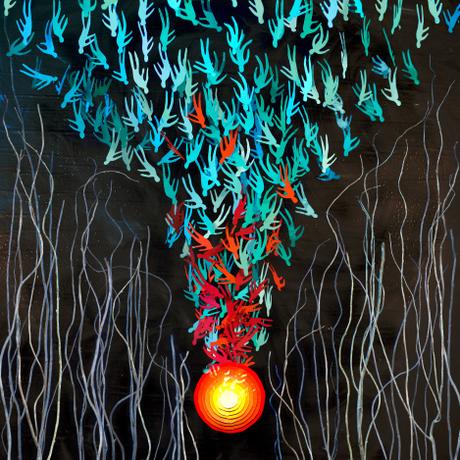
Bright Eyes return after a nine-year hiatus with the brilliantly titled new album ‘Down in the Weeds, Where the World Once Was’. The past (almost) decade has seen a huge amount of upheaval on a global and personal scale for Conor Oberst and this record focuses on the profoundness of mortality, broken relationships and grief.
Conor’s friendship with the other main members of Bright Eyes – multi-instrumentalists Mike Mogis and Nathaniel Walcott – remained strong throughout the band’s break and the reformation has been in the works since Christmas, 2017. Getting back together gave the trio a renewed sense of energy and purpose, resulting in their most collaborative songwriting process. They also called in Queens of the Stone Age drummer Jon Theodore and Flea (Flea!) to complete the rhythm section.
‘Pageturner’s Rag’ opens the album in traditional Bright Eyes style as a burst of ‘Digital Ash’-style glitchiness makes way to footsteps, bar room chat and Corina Figueroa Escamilla speaking in Spanish before announcing ‘your most vivid nightmares’ over some old-time piano. Conor’s mother, Nancy, soon joins the conversation talking about a ‘rose bush growing in the same spot again’ amidst jolts of laughter as the piano starts to falter. ‘Dance and Sing’ follows with drums, detuned guitars and strings that reminded us of Conor’s pal Tim Kasher’s solo material, while the lyrics are deliciously dark: ‘Gotta keep going like an ATM’; ‘I screamed when I realised what was happening. I had good news.
‘Just Once in the World’ opens with ruminations on Thanksgiving parades and standing on top of a float while ‘the world is waving goodbye’ before going on to tackle the absurdity of love over a dose of Paul Simon-style Americana: ‘Stroll to the edge of the cliff. Stop here and give me a kiss. Now we’re walking on air, there’s no hell beneath our feet’. You’ll know ‘Mariana Trench’ and what a fine addition to the Bright Eyes single discography it is, while ‘One and Done’ provides a throwback to the emotional fragility of ‘Lifted’. These are followed by the more electronica-influenced melancholy pop of ‘Pan and Broom’ with Conor asking ‘Is that blood on your hands or just chocolate and fruit?’ before things spiral downwards with mentions of the rapture and talking snakes: ‘Just whistle a tune while you’re digging a grave on a hot afternoon. Happiness left here too soon’.
‘Stairwell Song’ offers a candid account of a break up (‘You were smart but so foolish with your heart’) over a stirring combination of alt-folk melodies, brass and strings that capture the spirit of The Beatles’ ‘Penny Lane’. Conor talks about how his great imagination allows him to teleport out of difficult situations and then reminisces: ‘You were always sweet to me. You swept me off my feet and we went flying. You tried your best to hide all the sadness in your eyes, but I caught you every time that that was possible. You were kind, existential and refined, always something on your mind. Even then our love was not in question. Nothing changed. You just packed your things one day, didn’t bother to explain what happened. You liked cinematic endings’ – with the final sentence being delivered over a grandiose, orchestral blast of brass.
‘Tilt-A-Whirl’ finds Conor openly talking about one of his family’s tragic losses: ‘My phantom brother came to me and his backlit face was hard to see. I couldn’t move, I couldn’t scream’. It’s an evaluation of how life can be taken away so suddenly that also finds Conor leaning into the wisdom of his mother: ‘Life’s a game of solitaire, amusement rides at county fairs, the Tilt-A-Wheel of our despair ends suddenly’; ‘Life’s a lonely love affair, kaleidoscope beyond repair, it washes into thin air so suddenly’. ‘Hot Car in the Sun’ is an atmospheric piano-led ballad about a past relationship (‘I was dreaming of my ex-wife’s face’) and how as awful as you feel, you have to bear in mind that ‘this pain is not my own’.
As the album enters its final throes, the subtle and slow ‘To Death’s Heart (In Three Parts)’ is an evocative piece that ponders past mistakes, growing older and what might have been: ‘Gotta get out of here, I can’t remain. Limbs, they hung like chandeliers from alcohol and age’; ‘What’s it like to live with me every fucking day?’ The penultimate ‘Calais to Dover’ offers a warts-and-all account of this journey (‘Threw up on a ferry ride from Calais back to Dover, as pale as the White Cliffs that we face’) before finding Conor back in his hometown of Omaha and pleading with his former lover: ‘Tell me what’s gone’; ‘Tell me what’s wrong’; ‘Now that you’re gone, tell me you understand my love’. As his anxiety builds in search of closure, the guitars burst into anthemic power pop hooks that make you want to clench your fist and raise it to the sky.
The closing ‘Comet Song’ brings things down to a more intimate level as Conor evaluates his own actions (‘I guess this wild wanderlust just go out of control, I wish I could apologize and come in from the cold’; ‘Although I’ve told you many times I’m not much of a man, you held out that belief that at least I might pretend’) before looking back on the things he will miss from this relationship and then finishing with soundbites from the opening song, finishing the album in a neat loop.
‘Down in the Weeds, Where the World Once Was’ feels like an album that Bright Eyes HAD to make – and you will be so glad they did.
